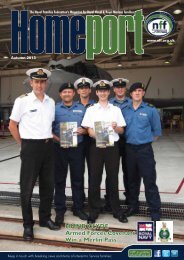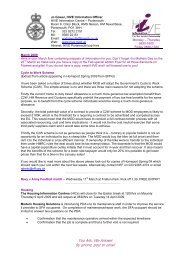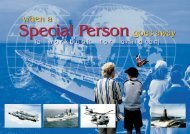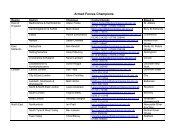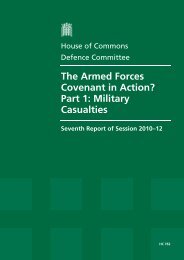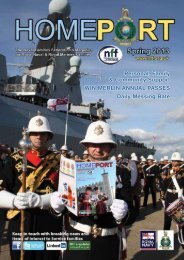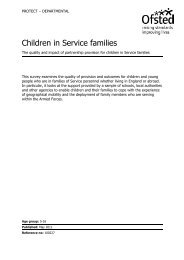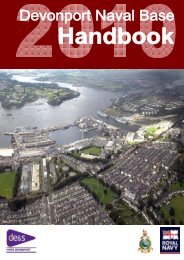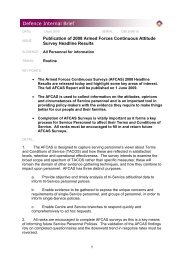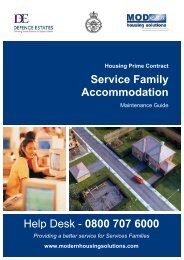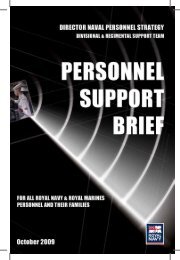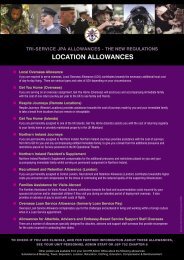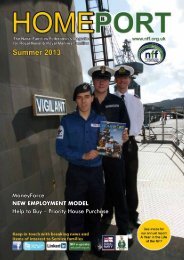Information - NFF
Information - NFF
Information - NFF
Create successful ePaper yourself
Turn your PDF publications into a flip-book with our unique Google optimized e-Paper software.
TWO six<br />
– Stay Safe<br />
Social Media websites are widely used by Service personnel, defence civilians, veterans and their friends and families as a<br />
way of staying in touch and communicating with loved ones whilst away on deployment.<br />
The MOD has launched an online security<br />
awareness campaign to inform users of the<br />
potential risks of social networks and the steps they<br />
can take to lessen these. Improper or irresponsible<br />
use of social media channels can present risks<br />
to operational and personal security unless<br />
appropriate steps are taken to safeguard personal<br />
and operationally sensitive information.<br />
Guidance for Staying Safe Online<br />
Whenever you use any social media channel<br />
such as Facebook, Twitter, Foursquare, Flickr<br />
or LinkedIn, make sure that you’ve familiarised<br />
yourself with the security or privacy settings.<br />
Be aware that information you share on these<br />
channels can be widely available and may be seen<br />
by people other than family and friends.<br />
Make sure you know who are you befriending<br />
online and don’t add friends that you don’t know.<br />
Never share any information which may put Service<br />
or defence personnel at risk (this may include<br />
technical information, operational plans, troop<br />
movement schedules, current or future locations<br />
of military units, aircraft and ships, descriptions of<br />
overseas bases, details of weapons systems, casualty<br />
numbers or discussions of areas frequented by<br />
Service members overseas). If you’re not sure<br />
whether the information that you’re sharing is<br />
sensitive, do not share it until you have sought<br />
clarification from your Chain of Command.<br />
Sensitive information that you share can also be<br />
found within photographs and videos, especially<br />
those taken in military establishments, and imagery<br />
of this sort can also identify Service personnel to<br />
the public against their wishes, putting them at risk.<br />
Do not share or tag information (including photographs<br />
or videos) about other serving personnel or defence<br />
civilians without gaining their permission first.<br />
Be careful when using location-based services<br />
such as Facebook Places, Foursquare and Gowalla<br />
since the information you provide through<br />
such sites can give away more than you intend<br />
about yourself and your regular movements. If<br />
you choose to use any of these services, make<br />
sure security and privacy settings are used<br />
appropriately, and that you do not ‘check in’ to<br />
military establishments.<br />
If you have shared information that you think may<br />
put others at risk, remove the information (text or<br />
imagery) from where you posted it, and inform your<br />
chain of command about your concerns to ensure<br />
remedial action, if any, is taken promptly.<br />
Identifying yourself as Service<br />
personnel or as a defence<br />
civilian and then posting<br />
information on public social<br />
media channels may bring<br />
yourself, your Service or the<br />
defence community into disrepute.<br />
Full details can<br />
be found on Defence<br />
Instructions and Notices<br />
2011DIN01-134 – Online<br />
Security Awareness<br />
Campaign.<br />
Online Dating Scams<br />
Some users of online dating websites have reported making contact with<br />
people who claim to be British Army soldiers on operations in Afghanistan<br />
or Iraq.<br />
Typically, they have reported building a relationship over time, through<br />
correspondence and exchange of photos etc – but eventually there is an<br />
attempt to defraud when the spoof soldier either asks for bank account<br />
details to transfer a significant amount of money, or by asking for money to<br />
enable them to go on leave.<br />
The former is a long-established scam (known as ‘Nigerian money scam’ or<br />
‘advance-fee fraud’) while the latter is a new, but outright, con! British forces<br />
personnel on Operations do not have to pay to go on leave, or to pay for<br />
flights, or replacement personnel.<br />
Anyone in such a position should cease all communications and contact their<br />
local police station.<br />
Remember: people online may not be who they say they are.<br />
Armed Forces Legal Aid Scheme<br />
The Armed Forces Criminal Legal Aid Authority (AFCLAA) is a tri-Service<br />
organisation that administers legal aid for the Armed Forces, including civilians<br />
subject to Service discipline, through the Armed Forces Legal Aid Scheme.<br />
Its main role is to process applications for legal aid and recover contributions,<br />
as appropriate, in respect of cases heard in the Court Martial (CM), the<br />
Service Civilian Court (SCC), the Summary Appeal Court (SAC) and Civilian<br />
Criminal Courts overseas.<br />
As a result of the changes to the civilian legal aid scheme, it has been necessary<br />
to revise the Armed Forces legal aid provision. The changes will re-establish<br />
broad equality with the civilian scheme and the underlying principle that Service<br />
Personnel and entitled civilians are not significantly advantaged or disadvantaged,<br />
compared to those receiving legal aid from the civilian scheme, and take into<br />
account the specific circumstances and needs of applicants, as well as the<br />
operational requirements of the Services and the Service<br />
Justice System (SJS). The revised scheme will be known as<br />
the Armed Forces Legal Aid Scheme 2011 (AFLAS 11).<br />
The revised scheme will continue to provide criminal legal<br />
aid to eligible personnel, but will use a more appropriate means test process,<br />
based upon the actual personal and financial position of the applicant, derived<br />
from the civilian scheme. AFCLAA will review all<br />
applications and inform the applicant of their eligibility<br />
for legal aid, the contributions they are required<br />
to make, if they accept an offer of legal aid, from<br />
income and capital/equity. Certain groups of<br />
applicants will continue to remain exempt from the<br />
means test assessment.<br />
Further<br />
information<br />
is available in DIN<br />
2011DIN01-096: The<br />
Armed Forces Legal<br />
Aid Scheme 2011<br />
(AFLAS 11).<br />
HOMEPORT AUTUMN 2011 21



